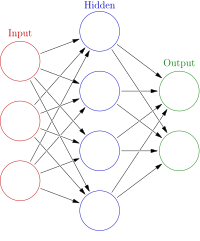
Photo from wikipedia
With the rapid growth of sharing economy in China, the ridesourcing has greatly affected urban residents’ travel. Based on the theoretical framework of the evolutionary game, this paper analyses the… Click to show full abstract
With the rapid growth of sharing economy in China, the ridesourcing has greatly affected urban residents’ travel. Based on the theoretical framework of the evolutionary game, this paper analyses the evolutionary game behavior between the Transportation Network Companies (TNCs) and passengers, and discusses the different evolutionarily stable strategies under the various conditions that the multi-stakeholders lie in. The theory and simulation results reveal the only evolutionarily stable strategy (strict management, honest behavior) will achieve, when the cost of strict management is less than the penalties of loose management for TNCs, and the cost of honesty is less than the penalties of dishonesty for passengers. Contrarily, when the government maintains the less regulation, the income of the loose management is greater than that of the strict management for the TNCs, which makes their initiative reduce. In addition, the behavior of dishonesty will be connived and grow. It turns out that the evolutionarily stable strategy may be (loose management, dishonest behavior). To achieve and maintain the perfect condition that TNCs take the strategy of strict management, while passengers take the strategy of honest behavior, it is necessary to improve and implement the mutual evaluation mechanism between the drivers and passengers, and impose a greater penalty on the loose TNCs. The results can guide stakeholders to make better decisions in the future.
Journal Title: IEEE Access
Year Published: 2018
Link to full text (if available)
Share on Social Media: Sign Up to like & get
recommendations!